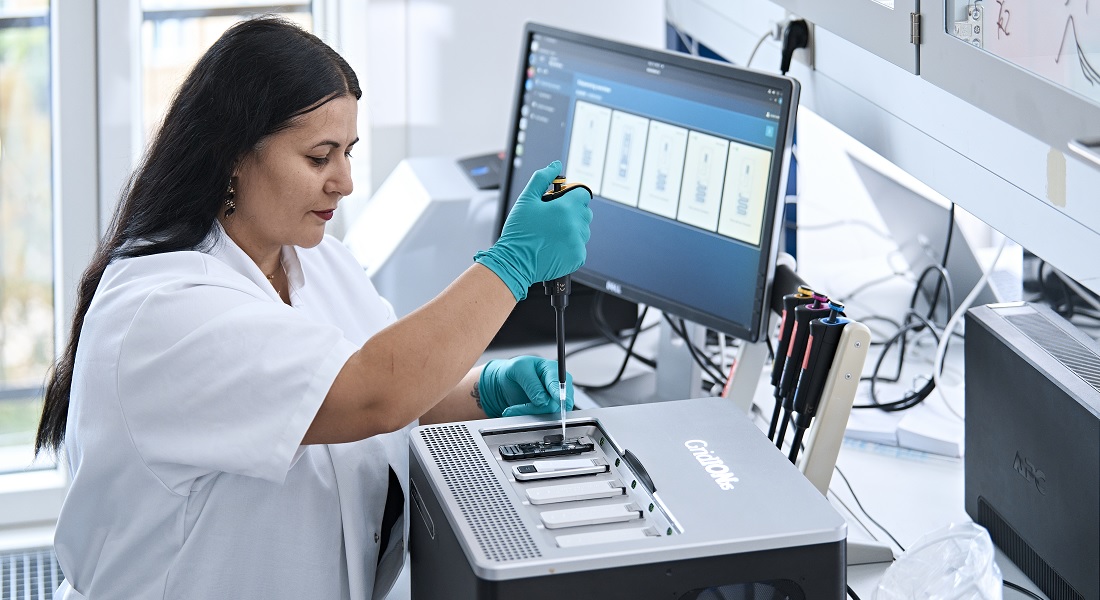Genomic platform

Description
The platform consists of an Agilent TapeStation 4200 for DNA/RNA quality assessment, a GridION; a third generation, real-time sequencing platform and a Bio-Rad CFX96 Real-Time PCR System.
The Agilent TapeStation 4200
Can be used for DNA/RNA quality assessment, providing fast, reliable sizing, quantification, and integrity checks for nucleic acids. It is a high-throughput, real-time sequencing platform supporting up to 5 MinION flow cells for long-read DNA/RNA sequencing. The Agilent TapeStation 4200 is an automated electrophoresis tool designed to analyze the quality and concentration of DNA and RNA samples. It supports a wide range of applications, from genomics research to next-generation sequencing (NGS) workflows. The platform uses ScreenTape technology, a flexible and prepackaged consumable format, to provide fast, consistent analysis of sample integrity, sizing, and concentration.
The TapeStation offers an intuitive interface, allowing users to quickly assess the quality of their nucleic acid samples, ensuring they meet the criteria for further experimental steps like library preparation or sequencing. Its scalability and automation make it ideal for laboratories needing to process samples with high precision and accuracy.
GridION (Oxford Nanopore Technologies)
The GridION by Oxford Nanopore Technologies (ONT) is a 3rd generation sequencing platform designed for real-time, high-throughput DNA and RNA sequencing. It can run up to five MinION flow cells simultaneously, each capable of producing long-read sequencing data (up to 45Gb). GridION integrates data processing, allowing users to analyze sequencing output in real-time. It's widely used for applications like whole-genome sequencing, metagenomics, and transcriptomics. With its flexibility and scalability, GridION is ideal for users needing to process multiple samples or projects.
Bio-Rad CFX96 Real-Time PCR System
The Bio-Rad CFX96 Real-Time PCR System is a platform for precise and quantitative detection of nucleic acids. Capable of running up to 96 samples at a time, it can be used for a wide range of applications such as gene expression analysis, genotyping, and other quantitative PCR (qPCR) assays. Its intuitive software allows for real-time monitoring and analysis of data, providing flexibility in experimental design. The system supports a wide range of applications, including SYBR Green and probe-based assays.
Options and requirements for use
We offer access to the TapeStation 4200 for both internal and external researchers. The system is available for DNA and RNA quality assessment to optimize samples for sequencing or other molecular biology applications. It can be used independently by experienced users or in collaboration with our trained personnel.
For accurate and reliable results, our team can assist in setting up the TapeStation runs, including sample preparation, running the assays, and interpreting the results. This service ensures your nucleic acid samples are in optimal condition for downstream analysis.
We provide access to the GridION sequencing platform for external researchers, institutions, and commercial parties. To ensure the highest quality results and proper use of the equipment, access is restricted to experienced users or those working in collaboration with our trained personnel.
For users requiring assistance, our staff offers expert guidance through all stages of the sequencing process—from sample preparation to data analysis. Additionally, we provide access to supporting platforms, including the TapeStation, for the assessment of DNA quality and concentration. This ensures your samples are fully optimized for sequencing, leading to accurate and reliable results.
For more information on equipment access running costs or to discuss your project needs, please contact our team to arrange training or collaboration opportunities.
The Bio-Rad CFX96 Real-Time PCR System is available for use by internal and external researchers. To ensure optimal use of the equipment, access is provided either to experienced users or with the support of trained personnel. Our team is available to assist with setting up experiments, optimizing protocols, and interpreting qPCR data, ensuring accurate and reliable results.
For more information on access, fees, or to schedule training, please contact us.
At the start of a collaboration on research with the University of Copenhagen, a cooperation agreement must be drawn up. There are different types of agreements depending on the nature of the cooperation. See more here: collaboration.ku.dk/cooperation-agreements/
Lukasz Krych
Associate Professor
krych@food.ku.dk

